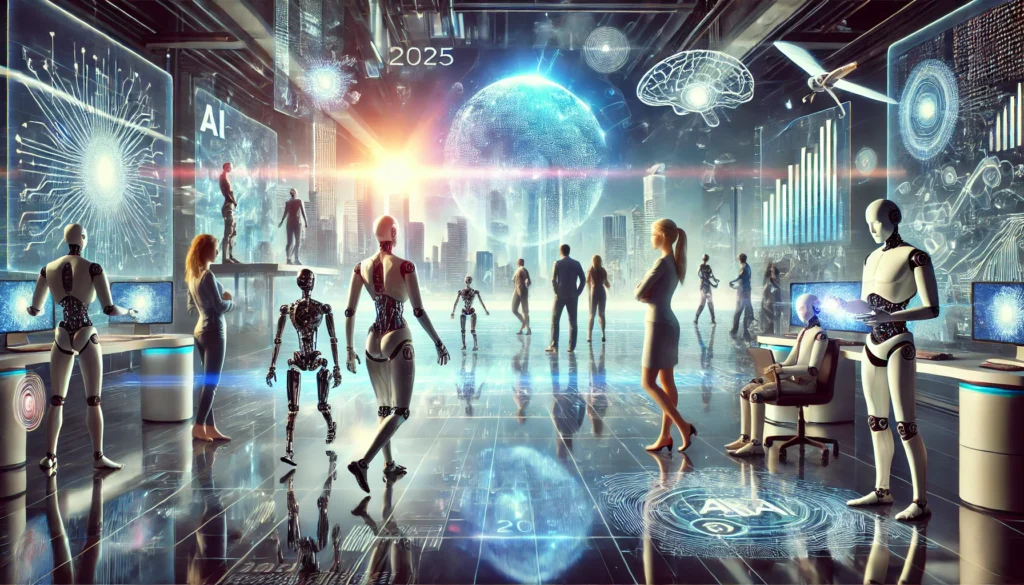As the world embraces the rapid advancements in artificial intelligence (AI), 2025 is shaping up to be a pivotal year in the journey toward achieving what is famously known as the “Turing horizon.” This term, inspired by Alan Turing, refers to the point where machines become indistinguishable from humans in their intelligence, behavior, and decision-making abilities. The implications of reaching this milestone are monumental, reshaping businesses, industries, and society at large.
In this article, we delve into the key trends, challenges, and breakthroughs that will define 2025 as the year when AI inches closer to the Turing horizon.
The Vision Behind the Turing Horizon
Alan Turing, often regarded as the father of modern computing, posed a thought-provoking question in 1950: “Can machines think?” This question laid the foundation for the pursuit of creating intelligent machines capable of human-like reasoning and interaction. The Turing horizon represents the ultimate realization of this vision—a future where machines are no longer just tools but intelligent agents that can understand, adapt, and seamlessly integrate into human workflows.
Chetan Dube, CEO of Quant and a pioneer in the AI industry, has dedicated his career to this vision. His mission to develop agentic AI, a form of artificial intelligence capable of autonomous decision-making, has brought us closer to the Turing horizon than ever before.
Breakthroughs Driving the Turing Horizon in 2025
1. Agentic AI: The Evolution of Intelligent Systems
Agentic AI represents a significant leap in the capabilities of artificial intelligence. Unlike traditional AI models, agentic AI systems are designed to mimic human cognition and decision-making. These systems are not merely reactive but proactive, capable of anticipating user needs and taking actions independently.
In 2025, the widespread adoption of agentic AI will revolutionize industries such as healthcare, finance, customer service, and logistics. For instance:
- Healthcare: AI-driven diagnostic tools will achieve near-human accuracy, assisting doctors in identifying complex diseases faster.
- Finance: Intelligent financial advisors will provide real-time investment insights while minimizing risks through predictive analytics.
- Customer Service: Digital assistants, like Quant’s flagship AI agents, will deliver hyper-personalized customer experiences, reducing wait times and enhancing satisfaction.
2. Eliminating Hallucinations: A Path to Trustworthy AI
One of the critical challenges in AI development is the issue of hallucinations—errors where AI generates inaccurate or nonsensical outputs. In industries like finance and healthcare, these errors can have catastrophic consequences. Recognizing this, researchers and companies like Quant have prioritized creating deterministic AI systems that produce reliable and trustworthy results.
The advancements in large language models (LLMs) combined with human language compilers are eliminating these inaccuracies. By layering deterministic algorithms on top of probabilistic neural networks, businesses can achieve the precision required for mission-critical tasks.
3. Integration of Multimodal Interactions
Gone are the days when AI interactions were limited to text-based chats or simple voice commands. 2025 will mark the era of multimodal AI, where users can seamlessly switch between text, voice, and video interactions. For example:
- A customer may start a query via chat, escalate it to a voice call, and then engage in a video consultation—all handled by the same AI assistant.
- These omnichannel experiences will redefine customer engagement, making it more intuitive and human-like.

The Business Impact of the Turing Horizon
1. Efficiency and Cost Reduction
Agentic AI will transform business operations by automating repetitive and time-consuming tasks. Enterprises will benefit from:
- 24/7 Customer Support: AI agents capable of handling millions of queries simultaneously, reducing operational costs and response times.
- Enhanced Productivity: Robotic Process Automation (RPA) integrated with intelligent AI will streamline workflows and eliminate human errors.
According to estimates, the widespread adoption of agentic AI could generate $4.4 trillion in economic value by 2030, with businesses achieving unprecedented levels of efficiency and profitability.
2. Job Creation Through Innovation
While there are concerns about job displacement due to AI, history has shown that technology often creates more jobs than it eliminates. The agentic revolution is no exception. As mundane tasks are automated, humans will be freed to focus on creative, strategic, and high-value roles that require emotional intelligence and critical thinking.
Moreover, the rise of AI will create demand for entirely new job categories, including AI trainers, ethics auditors, and multimodal interaction designers.
Ethics and Safety: The Cornerstones of AI Development
As we edge closer to the Turing horizon, ethical considerations take center stage. Ensuring that AI remains safe, ethical, and subservient to human needs is paramount. This includes:
- Embedding Ethics in AI Design: AI systems must be programmed with a robust moral framework, ensuring they act responsibly and transparently.
- Preventing Misuse: Regulatory frameworks and oversight are essential to prevent the misuse of AI for malicious purposes.
- Human Oversight: While AI can operate autonomously, humans must retain ultimate control over critical decision-making processes.
Chetan Dube aptly warns that failing to address these ethical concerns could lead to a dystopian future where AI becomes a threat rather than a tool for progress.
The Road Ahead: What 2025 Holds for AI
The journey toward the Turing horizon is not without its challenges, but the progress made so far is undeniably exciting. By 2025, we will see:
- Widespread Adoption: Businesses across industries will embrace agentic AI as a cornerstone of their digital transformation strategies.
- Enhanced Human-AI Collaboration: Far from replacing humans, AI will act as a powerful collaborator, amplifying human capabilities.
- Breakthrough Innovations: From predictive healthcare to autonomous financial systems, AI will unlock possibilities that were once confined to science fiction.
Conclusion: A Monumental Year for AI
As we step into 2025, the dream of reaching the Turing horizon no longer feels distant. The advancements in agentic AI, the elimination of hallucinations, and the integration of multimodal interactions are pushing us closer to a future where machines are indistinguishable from humans in their intelligence and behavior.
However, with great power comes great responsibility. Ensuring that AI is developed ethically and safely will be the defining challenge of this era. By addressing these concerns head-on, we can unlock the full potential of AI as a force for good, driving innovation, prosperity, and progress.





